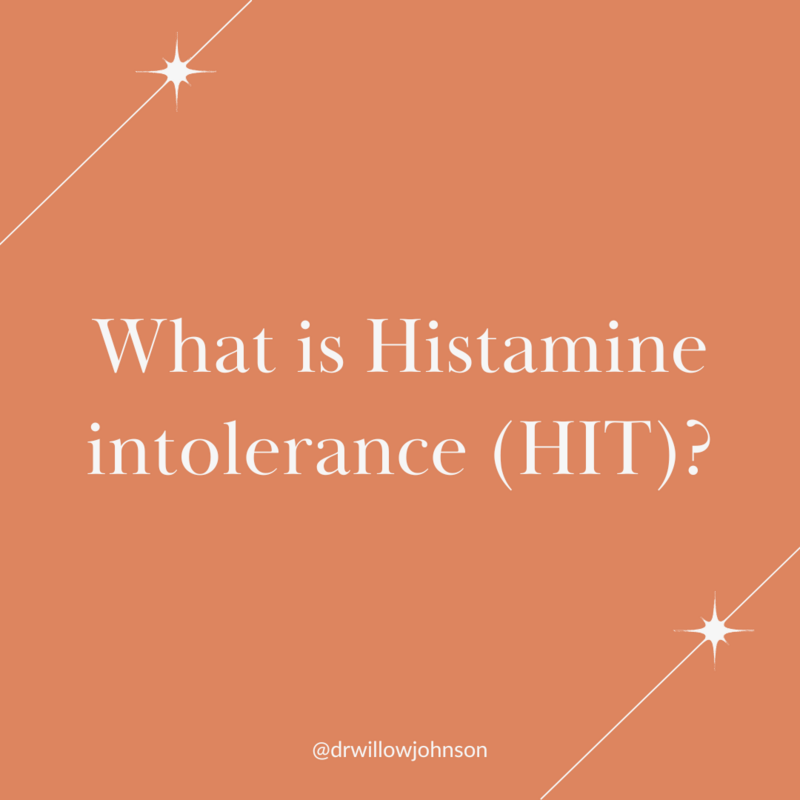HOME
MY STORY
SERVICES
ARTICLES
PRODUCTS
CONTACT
BOOK NOW
SERVICE OVERVIEW
ACUPUNCTURE
LABS
PRESCRIPTIONS
FAQs
What is Histamine intolerance (HIT)?
I’ve been seeing more HIT in practice lately and because most patients have never heard of it I wanted to offer some education. In the case that you, a friend or family member could benefit, listen up!
Most people have heard of Lactose intolerance, but what about Histamine intolerance? Also referred to as ‘enteral histaminosis’ or sensitivity to dietary histamine, it is a disorder associated with an impaired ability to break down ingested histamine. Most people think, “Huh? We ingest histamine?!”. People hear histamine and think of allergies.
Yes, histamine is involved in the allergy response, but this chemical also regulates a plethora of other processes like the secretion of stomach acid, inflammation, the narrowing or relaxation of blood vessels, and communication with the brain (neurotransmitter). And yes, we ingest it in foods! There are histamine rich foods, foods that cause your cells to release histamine, while others block your body’s enzyme that break down histamine in the digestive tract.
I love witnessing the “ah-hah” moment when patients realise that this may help explain a myriad of uncomfortable symptoms that they’ve been experiencing that seem to occur for no rhyme or reason.
Symptoms such as:
Chronic headaches & Migraines (especially if you’ve been diagnosed with vestibular migraines)
Flushing (like some people get from consuming red wine or alcohol) or trouble regulating their body temp
Feeling chronically stuffed up or a runny nose
Fluid retention
Anxiety or depression
Irregular or sped up heartbeat
Trouble falling asleep
Chronic fatigue
Abdominal cramps, nausea, reflux, diarrhea, and bloating
Dizziness or vertigo
Period pain
And more.
Some people present with hives or itchy skin, but not everyone. Some people report flushing, but not everyone. Often, one or more symptoms will clue us in, and it isn’t until after we’ve begun to treat (successfully) that patients realise this process was impacting many body systems and their mood, sleep, energy levels, digestion, and more.
(In the future, I hope to discuss the interplay between histamine and estrogen and progesterone; there is a reason we tend to see this more in the female body. Many of my patients report that symptoms started during perimenopause or occur leading up to their periods).
SO, do you suspect any of the following foods cause you issues (trigger headaches, make you feel stuffed up, cause digestive upset, etc)?
Alcohol
Fermented foods
Spinach, tomatoes, avocadoes
Bananas
Cow’s milk
Chocolate
Peanuts
Citrus
Leftovers – especially chicken or fish
(+ more)
When I list these top histamine foods, some patients get wide-eyed as something clicks while others don’t suspect any correlation. Sometimes it’s not until you remove the food for at least 2-4 weeks that you can begin to identify if these foods bother you.
The answer is not to eat a low histamine diet long term. A low histamine diet can be used to help rule in HIT and provide symptom relief while we work on the underlying cause. The goal is to determine why this started happening to you and fix it. While genetics can play a role, there is usually a culprit, such as:
Gut dysbiosis (imbalances in the microbiome), especially something called SIBO (Small Intestinal Bacterial Overgrowth)
Leaky gut
Gluten sensitivity
Stress
IBS or Inflammatory bowel disease
Certain medications (e.g. NSAIDs like Ibuprofen, antidepressants, anti-histamines, and H2 blockers like Pepcid and Zantac)
Allergies
Certain nutrient deficiencies
Conditions like Mastocytosis
In my practice, dysbiosis is the #1 cause I see along with gluten sensitivity, both of which tend to cause leaky gut. I also see stress be a major player.
When I think of some of the top HIT cases I’ve treated, some patients have had it showing up as depression, cystic acne, and period pain with no headaches, while others feel itchy all over and experience nearly constant hives but zero digestive upset. I think HIT is complex and research is somewhat limited as it is a newly recognized phenomenon. Pretty much, don’t count yourself out if you don’t have all the symptoms.
- Dr. Willow
Leave a Reply
WILLOW
meet
I help women achieve optimal digestive and hormonal wellness through a root cause, individualized approach to medicine that utilizes functional lab testing, diet and lifestyle modification, nutritional and herbal medicine, and acupuncture to re-establish lasting health.
LEARN MORE
women's ♀️ group health program coming soon, stay tuned 👀!
Gut health program coming soon, stay tuned 👀!
join
THE COMMUNITY
I WANT IN!
Between my wait listed practice and being Mom, I don't email often, but I'm working behind the scenes to bring you major value and I'd love to be able to tell you about it when it is ready (along with some more personal shares).

Be the first to comment